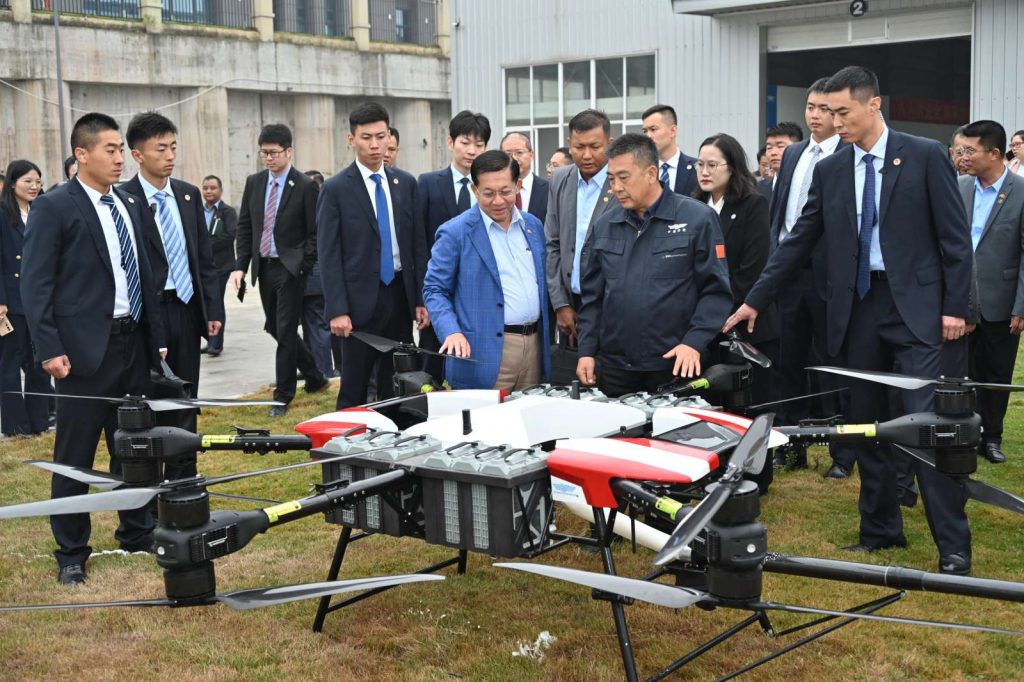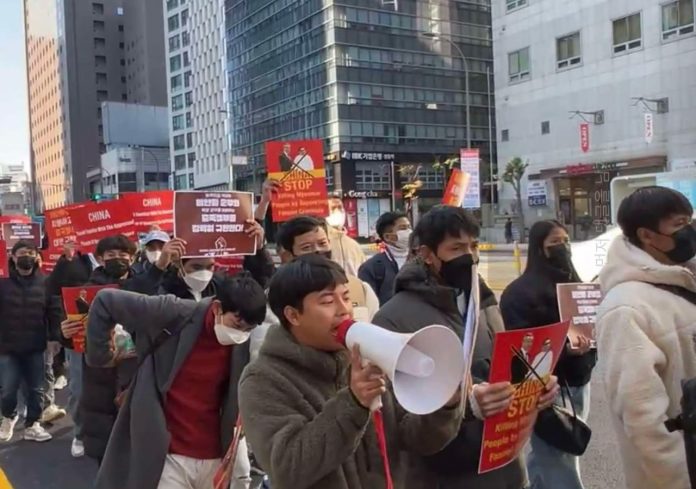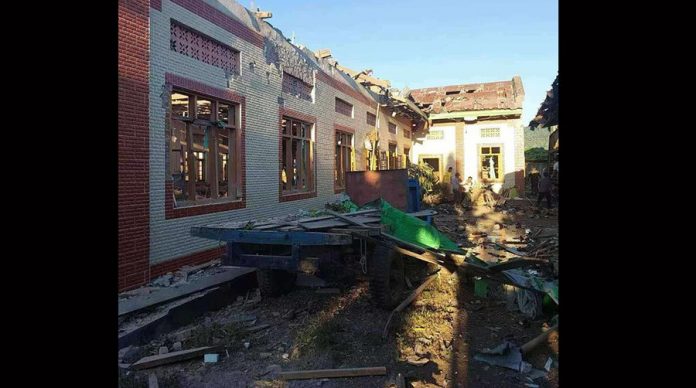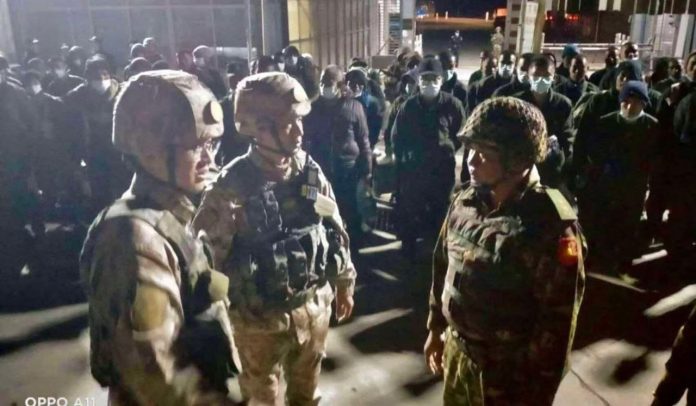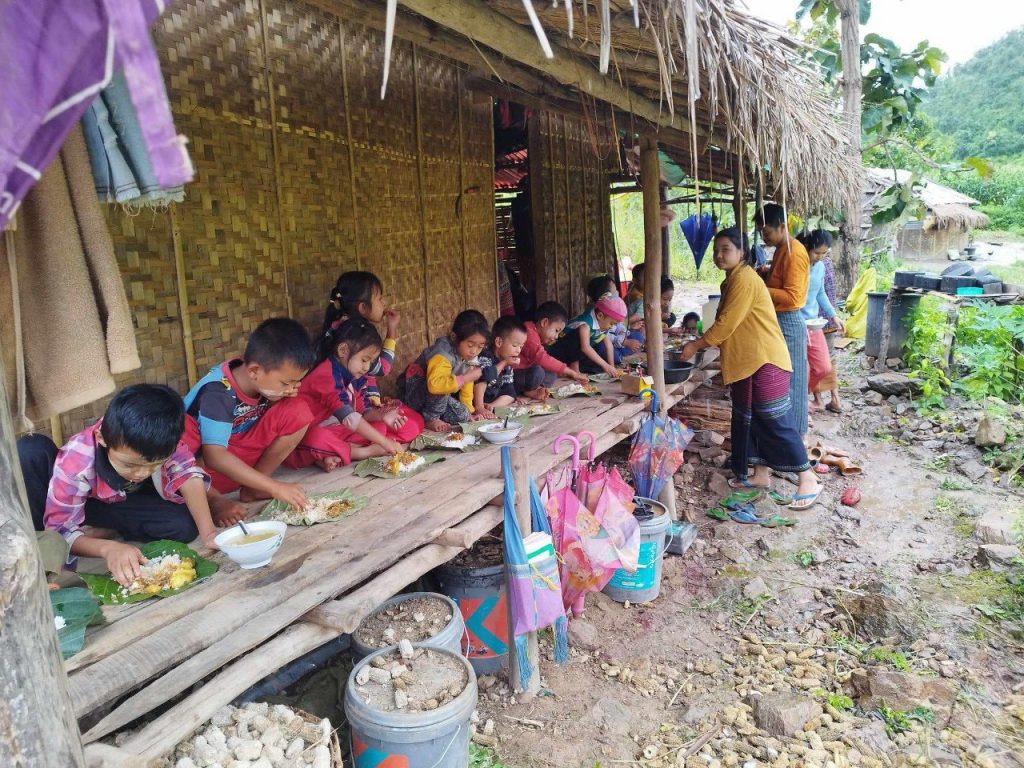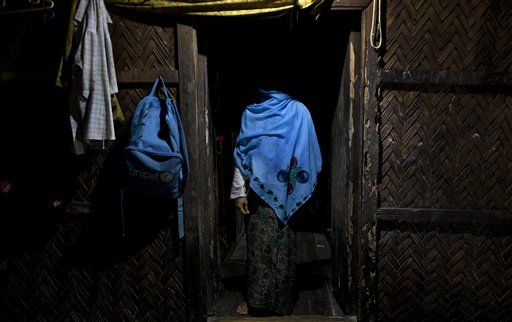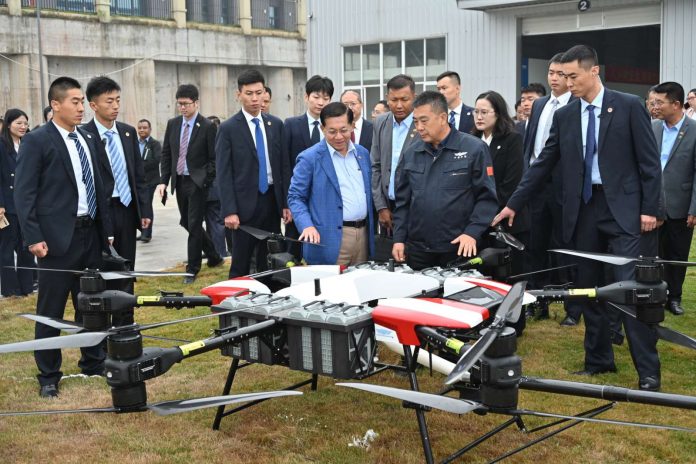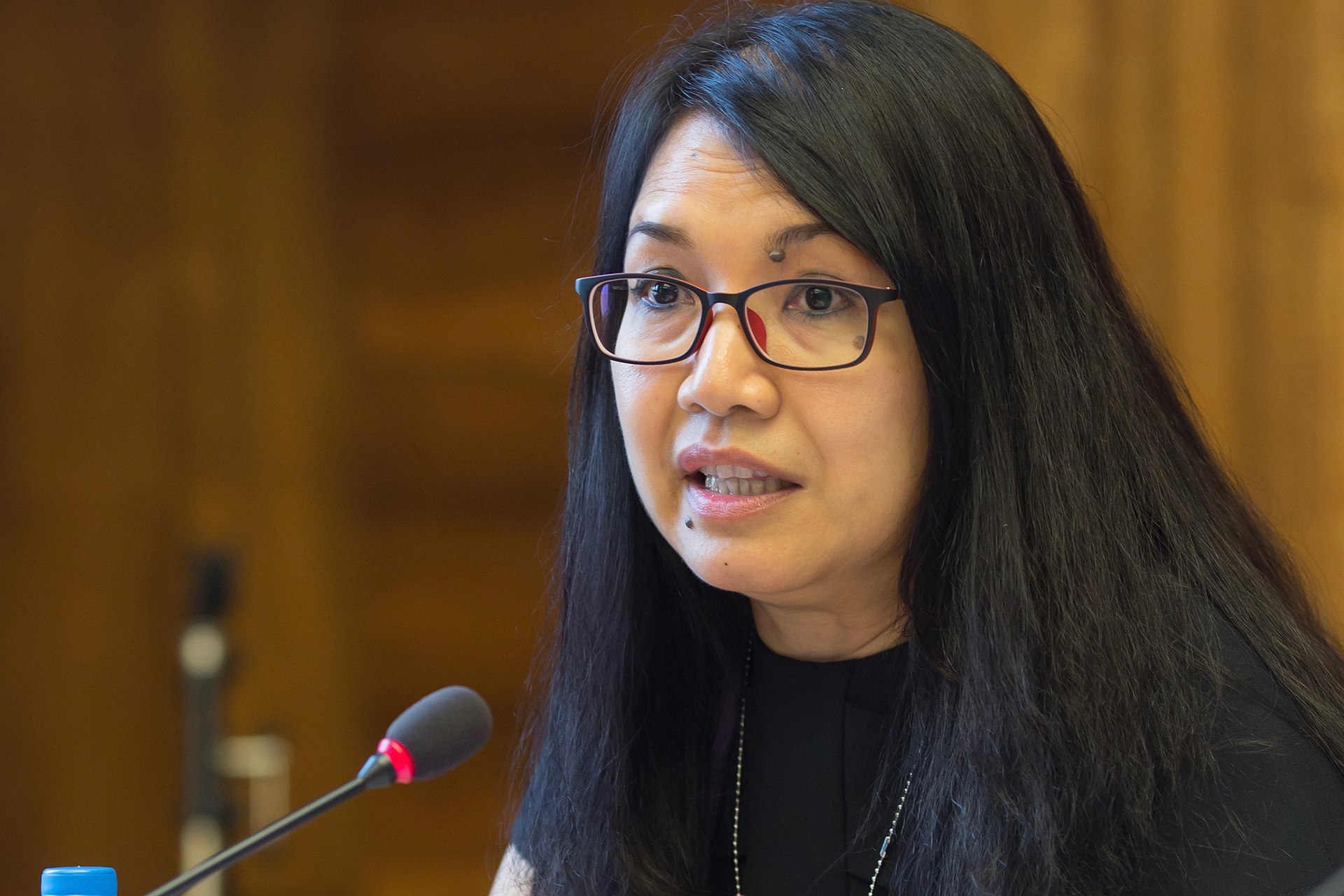Guest contributor
Khin Ohmar
I remember vividly in 1986, during my second year of university, a friend confided in me that seven Shan women were admitted to Taunggyi Public Hospital after they had been raped by Myanmar soldiers. While I felt distressed to hear this, from my position as a young Burman woman who had until then been sheltered from the direct abuses of the military, I couldn’t fully understand.
Why would military personnel commit crimes of sexual violence and how could they get away with it? How could victims and their communities be made to feel they must stay silent or risk more harm if they were to speak out about this violence or seek justice? It was the beginning of my own political awakening to the deeply entrenched systems and structures that protect those with power and perpetuate abuse and injustice.
As my activism and commitment to defend human rights developed and expanded, and I met countless survivors of Myanmar military violence – many of whom were survivors of military rape, so did my intersectional analysis of what it means to be a woman activist fighting for freedom in Myanmar. Even though my lineage came from Burman, Shan and Mon ethnicities, I understood my identities as a Burman, Buddhist woman with access to education were sources of power that offered opportunities and also protection from discrimination that women from ethnic minorities and rural areas didn’t have.
We have some lived experiences in common under military dictatorship, – but I could not know the experience of systemic layers of discrimination and abuse based on my ethnicity, religion, and location that Shan, Karen, Ta’ang, Rohingya and many other ethnic groups in Myanmar have faced daily across generations. Only when I met survivors and their communities in the late 1990s, could I expand my understanding on how the military enjoys blanket impunity, and how that impunity is entrenched across all levels of the society.
The more I came to know, the stronger and firmer my commitment to stand in solidarity became, and my commitment to use my sources of power to support oppressed and marginalized communities in their fight for equality, justice and accountability. To me, that’s the power of a truly powerful people’s movement or a women’s movement: – that we all come together, recognizing the different layers of discrimination and abuses we’ve faced or different sources of power and privileges that we gained from the system we lived in—, and we organize around a shared vision for a new system that promises a future of holistic, inclusive and durable peace.
In the past three decades, the U.N. has made strides to recognize the inordinate violence towards women and girls in conflict, including those committed by the Myanmar military, as well as the essential and urgent role of women in achieving peace. The U.N. Security Council Resolution 1325 – commonly known as the Women, Peace and Security (WPS) agenda – has brought international attention and a more human-centred focus to issues of peace and security, calling for women’s participation in peace processes, prevention and protection from human rights abuses, and women’s access to justice for conflict and post-conflict situations.
In recent years, the WPS agenda has been expanded to include LGBTIQ+ individuals as well. It has been the catalyst for countries to adopt National Action Plans for implementation of their own WPS agendas. Yet, in the 24 years since the Resolution was adopted, how much has really changed for grassroots women in conflict areas around the world, and in Myanmar? Conflict-related sexual violence continues with blanket impunity, and the Myanmar military’s crimes are more widespread than ever.
October marks the anniversary of the Women, Peace and Security resolution, and November hosts the Global 16 Days of Activism campaigns to end violence against women. This year’s theme for the 16 Days of activism is ‘Towards Beijing +30: UNiTE to End Violence Against Women.’ Three decades after the Beijing Declaration and Platform for Action and the UNSCR 1325 Women, Peace and Security agenda, it is time to truly unite and invest in women’s movements for justice, accountability, and durable peace. It is time to ground our strategies in the needs of grassroots women in conflict areas, and their visions for a peaceful future of coexistence. That is the only way to affect meaningful change for women and girls’ peace and security.
The time is not only right to focus on collective women’s movements, it is absolutely essential in this time of shifting power in Myanmar. As I speak with women and youth from the ground on their perspectives and strategies, there is an urgency for more nuanced and inclusive approaches toward rebuilding – but not reconstructing – Myanmar. Especially, at this moment in the revolution, people need to be organizing across all ethnicities and identities to discuss the kind of future they envision for themselves, their communities, and what a new Myanmar can look like. Women can and should take the lead.
The Women’s League of Burma (WLB) has been an instrumental voice of the women’s movement for 25 years, committed to build trust and understanding among the women of Myanmar from diverse backgrounds. They were pioneers at the forefront for women’s inclusion in peace processes through Resolution 1325. They have bravely acknowledged the damage of the military’s divide-and-rule mentality to people’s sense of community cohesion and solidarity across the many ethnicities of Burma. The WLB has also done the tireless work of exposing the military’s decades-long use of rape and sexual violence as a weapon of war, and the need to hold the military accountable for its abuses and crimes, while also promoting durable peace.
As Myanmar’s political transformation unfolds, indeed from the moment Naypyidaw falls into the hands of the revolution, it is at that point that things will need to become solid without delay. There is an immediate need to reach a political agreement to form a unified coalition government that can fill the power vacuum and serve as a transitional authority. This will ensure the state central system built and controlled for decades by the military is dismantled and replaced and strengthened by bottom-up people’s federal governance. In this regard, there is an urgent need for people-to-people—, and specifically women-to-women dialogues—, to prompt the visioning about how we want to live together and, to create peaceful coexistence together.
For decades, WLB has been laying the groundwork to prepare for the opportunities current political transformation emerged from the Spring Revolution creates. We need to set a new political agenda, with grassroots women’s voices— those who have resisted against the military’s central oppressive system and have been most impacted by the war and yet largely ignored and neglected. We need to come together as women to talk about how a political transformation can be achieved with the goal of human security and sustainable peace. Moving forward, a multi-ethnic, intergenerational grassroots women’s movement with a locally-led and owned women’s peace agenda in hand will contribute greatly to the various needs of the transition, including solid cohesion.
Now is the time for the women of Myanmar to mobilize and take their rightful place in decision-making of the revolution to determine the new vision of the country. Beyond our demands for at least 30 percent quotas for women’s participation at all levels of decision-making and our crucial campaigns against gender-based violence, we need to set our own agenda for peace. We talk about a ‘seat at the table,’ but if we are there to be tokenized, or to follow predetermined political agendas, how can that seat be meaningful and equitable? Women’s needs will never be prioritized nor our visions realized.
Women need to come with independent thinking—, and independent voices—, to the table. I am not naïve as to how hard this can be, but our challenge is to use this opportunity of political transformation to strengthen our existing relationships, coalitions and networks to articulate a vision for a federal Myanmar where all of our voices are represented, our concerns prioritized, and all perpetrators held accountable. We can only truly address gender-based violence and oppression when women are speaking independently, articulating an intersectional political analysis that accounts for the layers of discrimination, oppression and persecution that Myanmar’s diverse communities have long experienced. That is a true peace agenda for a new Myanmar.
The women of Myanmar can and must lead by mobilizing and organizing broadly at the grassroots. The international system, directly or inadvertently, often pits us against one another, creating a sense of competition among us for representation, resources, and access to information. But movements are not about a small group of brilliant individuals or leaders; they are about genuine inclusion of diverse communities and diverse perspectives, particularly of those most impacted on the ground.
Movements depend on leaders who can take a step back to nurture and facilitate members on the ground to join the shared leadership and be a part of decision-making. Successful and effective peoples’ movements for peace are built and joined by people who believe in themselves, and who have and share the wisdom from their lived experiences of survival through conflict. Who else will have more learning and insights for meaningful and effective conflict resolution for ending violence?
In this 16 Days of Activism, the international community can commit to unite with the women of Myanmar to support grassroots, women-led movement- building to set a genuine women, peace and security agenda for Myanmar from the ground up. Myanmar never developed a National Action Plan, and the 10-year National Strategic Plan for the Advancement of Women (NSPAW), adopted in 2013, only included a ‘women and emergencies’ category; it did not comprehensively address women in conflict areas, nor the multiple layers of structural oppression that ethnic minority women have endured that impedes their safety and security. A genuine federal democracy that protects and promotes the peace and security of all must explicitly address the grievances of ethnic minority women, and their vision of peace and human security. Grassroots women’s movement- building can help to clarify what is needed and how to enact it.
Nepal provides a positive example of an inclusive and bottom-up approach to women’s mobilization that helped to define and set the country’s National Action Plan for Resolution 1325. Through widespread consultations and dialogues with diverse women from across the country, the plan recognizes 14 categories of conflict-affected women including single women (widows) and disabled women. The inclusive approach allowed for the intersectional analysis needed to address the specific impacts of the conflict. Importantly, it also helped to strengthen and expand the grassroots movement and civil society participation that is needed to hold the government accountable to implement the plan.
While a national plan for WPS 1325 is still a distant dream for women in Myanmar, the Association of Southeast Asian Nations (ASEAN) has also proven it does not have the will or the capacity to address sexual and gender-based violence against women, despite its own declaration to end this violence. It held its Ministerial Meeting on Women—and other meetings relating to women and children—in Myanmar together with military representatives in October, despite public outcry at the hypocrisy for neglecting the host country’s women’s suffering at the hands of the military. Allowing the military to host any meeting, much less ones discussing women and children’s welfare, is shameful complicity by ASEAN in the ongoing sexual and gender-based violence and other atrocity crimes in Myanmar.
It is fact that the Myanmar military has been blacklisted by the U.N. for sexual violence since 2018. That same year, the Special Representative of the Secretary-General on Sexual Violence in Conflict Pramila Patten signed a joint communique between the then Aung San Suu Kyi-led elected government of Myanmar and the U.N. to address conflict-related sexual violence. The following year, the UN Fact-Finding Mission found that the Myanmar military had long used rape as a weapon of war. It is well documented that the Myanmar military is misogynist, patriarchal and that conflict-related sexual and gender-based violence (SGBV) is pervasive and endemic.
How can ASEAN blatantly ignore that? What was there to discuss in those meetings if not these gravest crimes against women? Where is the ASEAN commitment to end violence against women that they declared publicly? Worse, the ASEAN’s recently-developed Regional Action Plan for Women, Peace and Security 1325 lacks relevance to the peace and security needs of women in Myanmar who are under attack by the military. Far from being part of a peaceful resolution, ASEAN is hindering sustainable peace and gender justice in Myanmar.
With the momentum of this year’s anniversary of Resolution 1325 and the start of the 16 Days of Activism international campaign ‘Towards Beijing +30: UNiTE to End Violence Against Women,’ we must shift towards mobilizing a grassroots women’s movement for sustainable peace, based on and rooted in human security and gender equality. Women can form the shared political leadership needed for this moment of political transformation towards establishing federal democracy with genuine solidarity and investment by the international community.
The international community must unite and act in solidarity by listening to women and building trust and a better understanding of the context and the solutions that grassroots women identify. The international community must not lead, nor rush, force, or speed up the process needed for genuine and meaningful on-the-ground processes. ASEAN must also support Myanmar people-led and owned dialogue processes. Quick fixes will not bring sustainable solutions. In this regard, Thailand, as Myanmar’s closest neighbour, can support Myanmar peoples’ efforts towards sustainable peace by providing safe spaces for movement building through people-to-people and women-to-women dialogues.
Too often women activists and peacebuilders have been used by the international system and mechanisms as tokens to promote its own agenda, without genuine consultation with, and meaningful participation by, the women most directly impacted. This approach is at best piecemeal in terms of advocacy and at worst becomes empty rhetoric disconnected from the realities on the ground. The international approach can even become an unnecessary burden or pressure on women, where their information is extracted and/or their work used without proper credit. Either way, grassroots women and their concerns are sidelined.
The Friends of 1325, an informal and ad-hoc group of countries who formed to advocate for implementation of Resolution 1325, must publicly support the Myanmar women’s movement as key agents of change for a new Myanmar, and support their ongoing efforts for justice and accountability. The Philippines, as part of the Friends of 1325, could take the lead within ASEAN to condemn and sanction the Myanmar military in this regard.
The Chin Human Rights Organizations (CHRO) made a submission to the Philippines Department of Justice over a year ago, and there has yet to be a response. Now is the time to move that case forward. Governments in the Friends of 1325—notably Philippines, Korea, and Japan as Asian neighbours—can follow Argentina’s path in exercising universal jurisdiction to prosecute cases against the Myanmar military for sexual violence cases against Rohingya women as crimes against humanity.
Finally, Myanmar women activists and leaders must unite to collectively invest the time and heart to listen deeply to grassroots women’s experiences and learn from their perspectives on peace and security. A mass movement built on listening and wisdom is the greatest potential towards finding and identifying solutions to achieve genuine and sustainable peace. This vibrant movement will require collective effort for transformational processes of true nondiscrimination and inclusion, to overcome the differences that have kept us apart for generations.
As the revolution advances further, civilian protection has become an urgent matter to address. Now is the time for women to consolidate their political leadership and agenda setting as peace builders and change agents. The key to success for an agenda truly committed to women, peace and security is the prioritization of locally-led inclusive consultation processes among and between grassroots women from diverse communities—including Rohingya women—to develop a women’s peace agenda for a sustainable federal future.
Khin Ohmar is a Myanmar human rights activist who was involved in organizing the 1988 nationwide pro-democracy uprising. She is also the founder of Progressive Voice, a Myanmar human rights organization.
DVB publishes a diversity of opinions that does not reflect DVB editorial policy. We’d like to hear what you think about this or any of our stories: [email protected]

